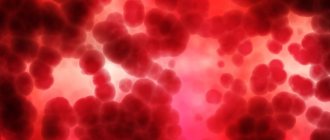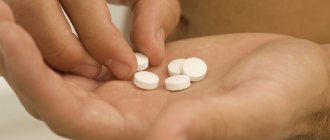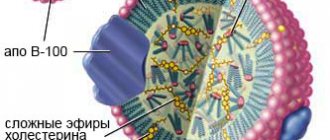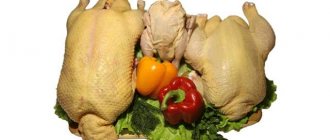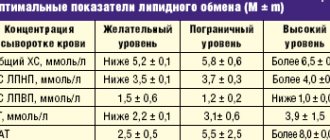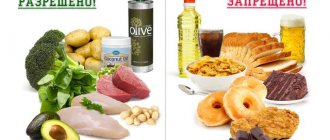Valuable constituent elements
Eggs are unique in their nutritional value. The protein component of the product is a complete building material for the body’s cells and the basis for the creation of enzymes, hormones and other compounds.
Boiled or fried egg whites are not inferior to meat proteins, but are easier to digest by the intestines and absorbed in the body. Egg white contains a number of enzymes (protease, dipepsidase, diastase), as well as a small percentage of glucose.
Chicken eggs contain healthy elements:
- carotenoid lutein – maintains visual acuity, inhibits the action of free radicals and premature aging;
- amino acid tyrosine – protects the body from the effects of stress, improves cognitive abilities (attention, memory, etc.);
- lecithin – contains phospholipids, which improves liver function and helps in the production of HDL;
- lysozyme is an antibacterial intestinal enzyme involved in the regulation of intestinal microflora;
- PNFA or polyunsaturated fatty acids (linoleic, linolenic, Ω-3, Ω-6) – regulate lipid metabolism, reduce the amount of triglycerides and LDL in the blood;
- MUFA or monounsaturated fatty acids (palmitoleic and oleic) - stimulate the excretion of LDL and break down saturated fats.
Eggs contain a lot of phosphorus, which improves brain activity, potassium, which normalizes heart function, and iron, which supports hematopoietic processes. Fat-soluble vitamins included:
- retinol (A) – nourishes the skin and hair, increases the body’s regenerative abilities;
- ergocalciferol (D2) and cholecalciferol (D3) – ensure the health of the musculoskeletal system, strengthen the immune system, and inhibit the development of oncological processes;
- tocopherol (E) – increases vascular permeability, accelerates blood circulation.
The product contains a complex of B vitamins with a predominance of:
- choline (B4) – an active participant in the metabolism of fats in the liver;
- pantothenic acid (B5), which has a positive effect on the functioning of the brain, adrenal glands and central nervous system.
Fat-soluble vitamins, fatty acids and all lipids are concentrated in the yolk.
No ads 1
Energy value and nutrients in the composition
70-75% of the raw product consists of water. Approximately 12% each comes from proteins and fats. Carbohydrates are present in minute quantities (less than 1.5%). Poultry eggs have different energy values. The largest varieties - goose and duck - are the most nutritious. The nutrient content differs slightly. Geese are the leaders in the amount of protein, and ducks are the leader in the amount of fat.
Comparison table of nutrients and calories per 100 g
| Type and BZHU | Chicken | Duck | Turkey | Quail | Goose |
| Squirrels | 12,8 | 13,7 | 13,1 | 13,1 | 14,0 |
| Fats | 11,8 | 14,4 | 11,7 | 13,1 | 13,0 |
| Carbohydrates | 1,0 | 1,2 | 0,7 | 0,6 | 1,2 |
| Kcal | 157 | 202 | 169 | 168 | 190 |
The average weight of a chicken egg is 40-45 g, which corresponds to 63-70 kcal.
Composition, beneficial properties
Quail eggs are rich in vitamins, minerals, and microelements. They contain (% DV per 100 g):
- Vitamin A (54%). Necessary for normal growth and skeletal development. Responsible for reproductive function, skin condition, eyes, supports the immune system.
- Vitamin B2 (36%). The main element of redox reactions: respiration, metabolism, activity of the nervous system. Vitamin B2 deficiency worsens the condition of the skin and mucous membranes, and is accompanied by blurred vision.
- Vitamin PP (16%). Participates in metabolism and provides the body with energy. Its insufficient quantity worsens the functioning of the gastrointestinal tract, nervous system, skin condition, and nails.
- Choline (101%). This organic compound is part of lecithin. Responsible for the synthesis of phospholipids by the liver. It has a lipotropic effect: normalizes lipid and cholesterol metabolism, stimulates the removal and oxidation of fat from the liver.
- Phosphorus (27%). An important element in most physiological processes, including metabolism. Regulates the functioning of the digestive tract and acid-base balance. Necessary for strengthening teeth and bones. Lack of phosphorus leads to anorexia, anemia, and rickets.
- Iron (18%). Moves electrons and oxygen throughout the body. Regulates the course of redox processes. Iron deficiency worsens the blood, causes anemia, atrophic gastritis, myocardiopathy, reduces skeletal muscle tone, and reduces performance.
- Cobalt (140%). Stimulates cholesterol metabolism, metabolism.
- Copper (11%). Responsible for iron metabolism, improves the absorption of proteins, carbohydrates, and fats. Provides peripheral organ tissues with oxygen. Lack of copper impairs the functioning of the cardiovascular system and disrupts the formation of the skeleton in children and adolescents. Rarely causes connective tissue dysplasia.
- Chromium (28%). Regulates the concentration of glucose in the blood. Its deficiency reduces the effect of insulin and glucose tolerance.
The weight of one egg is 9-18 g, energy value is 168 kcal. Protein/fat/carbohydrate ratio – 12/13/0.6 g.
Cholesterol and saturated fatty acids in yolks
Cholesterol in chicken eggs is about 420 mg per 100 g of product, which is seven times less than the total content of saturated fatty acids (palmitic, stearic, myristic, etc.). Their component is 3 g/100 g.
Saturated fatty acids (SFAs) promote the formation of low-density lipoproteins (“bad” cholesterol), which settles on the inner surface of the vascular walls. This causes the formation of cholesterol plaques. PUFAs and MUFAs contained in egg yolks break down unhealthy saturated fatty acids, but do not completely neutralize them.
[node:field_similarlink]
Calculation of daily norm
The safe daily intake of exogenous cholesterol for people who do not suffer from hypercholesterolemia and atherosclerosis is about 300-400 mg, saturated fatty acids - 15 g. For high cholesterol, it is recommended to reduce the portion by half. For atherosclerotic pathologies - three times.
Reference: Normal levels of cholesterol in the blood are from 3.3 mmol/l to 5.2 mmol/l.
Considering the weight of the product, it is easy to calculate how many saturated fatty acids and how much cholesterol are in an egg:
- 420*40 (45) / 100=168 (189) mg – cholesterol in 1 pc.
- 3000 * 40 (45) / 100 = 1200 (1350) mg = 1.2 (1.35) g – EFA in 1 pc.
It turns out that the maximum amount that a person with normal blood composition can afford is two eggs a day. For hypercholesterolemia - no more than one. Taking into account other foods in the daily diet that contain animal fat, this portion should be even smaller.
If the level of cholesterol in the blood is normal, there is no need to artificially reduce it. Deficiency is no less dangerous to health than excess. A complete rejection of animal products leads to a failure of biochemical processes in the body.
Cholesterol is an organic fatty alcohol that is found in the cell membrane and protects cells from negativity. Without it, sex and steroid hormones and bile acids are not produced, vitamins A, E, D are not absorbed, interneuron connections are disrupted, and pregnancy does not develop.
No ads 2
Is it possible to eat eggs if you have high cholesterol?
You need to understand a simple but important thing: high cholesterol levels are not the result of eating foods high in cholesterol, but a disruption of metabolic processes in the human body. On the other hand, lecithin undergoes transformation when it enters the small intestine. The output is a new substance, trimethylamine oxide, which in large doses exhibits toxic properties and is poorly absorbed by the body.
The dietary intake rate must be correctly calculated for each person. Many adherents of a healthy lifestyle have no idea how to properly use this or that product in order to get the maximum benefit from it.
If your cholesterol levels are elevated, you should always listen to the recommendations of doctors and nutritionists. Quail eggs and cholesterol are related. Their amount in the diet depends on the current state of health and the specific organism.
The effect of eggs on blood cholesterol levels
Do eggs raise cholesterol? Based on the composition, normalized use of the product cannot cause cardinal harm to the blood vessels of a healthy person. With hypercholesterolemia, overuse of egg yolk can accelerate pathological changes in the arteries.
Recent scientific research has proven that the problem of high cholesterol lies not in the eggs themselves, but in their improper consumption. Combining eggs with other foods is extremely important.
Depending on the combination of cholesterol with proteins, carbohydrates, fats (vegetable and animal), high-density or low-density lipoproteins are formed. The same rule applies to the unsaturated fatty acids that make up the yolk.
Cholesterol in milk
Eggs become potentially dangerous if eaten with foods rich in animal fats:
- sausages;
- butter (ghee);
- cottage cheese with a fat content of more than 5%;
- hard cheeses, processed cheeses;
- offal and meat of duck, goose, pig.
Based on this, many people's favorite breakfast - fried eggs with sausage and cheese in butter - is a cholesterol bomb. After such a dish, the level of LDL in the blood definitely increases.
According to the diet prescribed for hypercholesterolemia and atherosclerosis, the listed products are eliminated from the diet, but even with normal cholesterol levels, nutritionists do not advise combining eggs with other fats of animal origin.
When eating eggs together with fast carbohydrates, the body first processes sweets. The liver converts excess glucose into triglycerides. The result is an increase in blood sugar and cholesterol levels. The cholesterol found in a boiled egg is consumed by hepatocytes (working liver cells) as a source of bile acids.
Raw yolk is not suitable for the production of bile acids. When eggs are eaten raw, the cholesterol that is not used by the liver remains in free form. Part of it is likely to be transformed into low-density lipoproteins. By increasing the concentration of LDL, the total level of cholesterol in the blood will increase.
In addition to raw eggs: they are poorly digestible by the stomach and intestines, they may contain salmonella (pathogenic bacteria that cause acute intestinal infection), and it is possible that they contain antibiotics added to feed at poultry farms. The raw product inhibits the absorption of iron into the blood, which can cause anemia.
No ads 3
What Research and Guidelines Say
Scientific evidence about the dangers of cholesterol remains controversial. These individual studies may be discouraging for egg eaters. For example, a 2021 analysis of six studies found that dietary cholesterol is associated with heart disease and the risk of death from it. However, overall the studies provide mixed results, making it difficult to draw firm conclusions.
Due to the lack of evidence of the harm of cholesterol and the benefits of limiting its amount in the diet, it was “crossed out” from the list of dangerous food factors in a number of documents. The maximum amount of dietary cholesterol is no longer specified in the American Dietary Guidelines and the American Heart Association's guidelines for reducing cardiovascular risk. Previously (for example, 20 years ago) it was recommended to consume no more than 300 milligrams of cholesterol per day.
Eggs are good and bad
Eggs are a good source of quality proteins, vitamins and other bioactive substances, including carotenoids, choline and lecithin. Among other protein foods, they are included in the American Dietary Guidelines. Many people avoid eggs in their diet because some evidence suggests the cholesterol they contain may increase the risk of heart disease.
How to eat eggs correctly
The product interacts well with fiber- and vitamin-rich vegetables (tomatoes, peppers) and herbs (dill, parsley, cilantro, etc.). Boiled eggs will be healthier as an independent dish. In accordance with the latest recommendations of nutritionists, for normal absorption of protein and yolk and to prevent changes in the composition of the blood, eggs are eaten:
- boiled, not combined with anything else;
- in the form of an omelet (fried eggs) with herbs and tomatoes.
For frying, use only vegetable oil.
Help: A diet for hypercholesterolemia excludes the consumption of any fried foods, including scrambled eggs. The omelet is prepared by steaming or in the microwave.
Approximate consumption rates per week:
- for people without blood lipid disorders – up to 8 pcs.;
- for uncomplicated hypercholesterolemia – up to 4 pcs.;
- for atherosclerosis – up to 2 pcs.
In order not to exceed the daily cholesterol limit, patients following a low-cholesterol diet should take into account the total amount of fat (eggs + other animal products).
Useful recipes for atherosclerosis
Atherosclerosis is a serious disease of the arteries. Leads to irreversible processes in the entire vascular system. The development of atherosclerosis causes increased accumulation of cholesterol in the vessels. If the tests are aggravated by improper treatment, complications of the disease are inevitable. To prevent this from happening, you must adhere to the following tips:
- Green vegetables and fresh fruits help cleanse the intestines and arteries.
- Eliminate processed meats and reduce the amount of salt in food.
- Eliminate strong alcohol and tobacco from your diet.
- To speed up the replacement of “bad” cholesterol with “good” cholesterol in atherosclerosis, include quail eggs in the diet (but in reasonable proportions).
These simple tips, along with doctors’ recommendations, get rid of the disease.
In terms of the content of substances beneficial to the body, quail eggs can compete with many products. However, in everything you need to know the limit and not cross it. There is no need to self-medicate, because you cannot fool nature. Only by following these rules can you safely hope for the maximum effect from little carriers of health.
